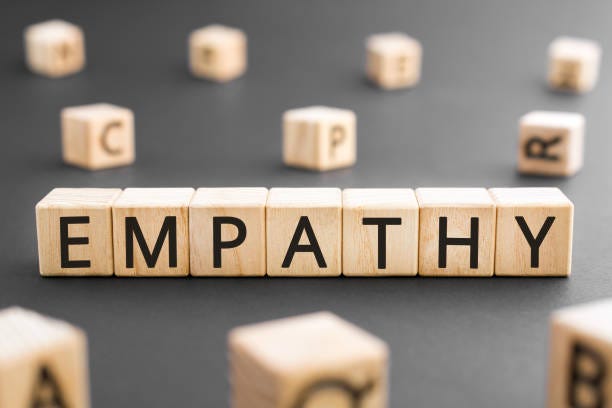Empathy, the Pinnacle of Intelligence
Masculine-dominated societies often undervalue empathy—and women must stop internalizing that message.
Empathy is often labeled as a soft skill. It's feminine, emotional, unscientific, and even irrational—at least in popular perception. But even though it keeps getting treated like a bonus rather a necessary trait, empathy is perhaps, one of the most logical forms of intelligence we have.
We tend to separate logic and emotion in public discourse. We’re told logic is cool, rational, and male-coded. Empathy is warm, emotional, and female-coded. As a result, empathy is routinely dismissed in intellectual circles.
But evidence shows this binary is not just false—it’s destructive. From leadership to conflict resolution, empathy allows us to apply logic about others rather than just for ourselves.
One can reasonably argue that empathy is not divorced from logic—it is logic, applied relationally. When we treat people like objects or disregards the affects of our actions towards them, we reject both empathy and reason. The consequences of this play out across homes, workplaces, institutions, and nations.
Empathy is not the opposite of logic—but one of its highest expressions.
Empathy: A structured measurable skill
Empathy is not about merely “being nice.” It’s the cognitive ability to recognize that another person has an internal world, and that their emotions, thoughts, and preferences may differ from yours.
Neuroscience has identified specific brain regions that activate during empathic thinking showing that empathy is a form of perspective-taking; cognitive precision deeply embedded in human neurology.
In a study published in Trends in Cognitive Sciences, researchers found that empathy enhances decision-making in complex social environments—particularly when long-term cooperation is needed.
Logic without Empathy leads to dehumanization
When people think of logic, they imagine systems, equations, or debate. But logic at its core is about responding to truth. A truly logical person responds to what things are not what they think they are.
For example, humans are not objects. They are rational, sentient beings with an innate drive for:
Freedom
Dignity
Connection
Safety
To treat a human being as if they are not—just a sexual object, a resource, or a tool—or ignore their needs or innate desires is not just immoral. It is illogical. It ignores the fundamental nature of the human being.
This is why objectification is not only an ethical problem—it is a cognitive error.
The most “logical” thing we can do, socially and politically, is recognize each other as fully human.
Empathy prevents social and personal breakdowns
Lack of empathy doesn’t just hurt others—it creates dysfunctional systems. At scale, unempathetic behavior results in:
Toxic workplaces
Exploitative relationships
Abusive governments
Burnout in caregivers
The irony is that the outcomes of unempathetic behavior almost always “blow back” onto those who perpetuate them. The cold boss creates employee apathy. The emotionally detached parent builds distant children. The system that ignores citizens' needs faces unrest. This is why when our society suppresses or mocks empathy—especially in men, especially in power—we weaken our systems, strain our relationships, and fuel the very instability we claim to fear.
Empathy Strengthens Systems
Healthcare
Patients under the care of empathetic doctors have better outcomes. In a study published in Academic Medicine, diabetic patients of highly empathic physicians had significantly better outcomes.
Workplaces
Envision a workplace where leaders ignore their team’s needs, or a conversation derailed by misunderstanding. A Harvard Business Review report found that empathy ranked among the most important leadership skills, particularly in post-pandemic management. Managers who listened, understood, and adapted to employee stress saw greater retention and innovation.
Relationships
Empathy helps prevent relationship breakdowns. But women often carry this burden alone. They are expected to anticipate emotional needs, resolve tension, and maintain harmony. Meanwhile, men are often culturally not taught to reciprocate. This imbalance leads to resentment and fatigue.
Valuing empathy requires its recognition as a shared responsibility, creating equitable, resilient communities.
Empathy’s Logical Boundaries
Empathy’s strength demands balance. Overextending—absorbing others’ pain or prioritizing their needs excessively—risks burnout, compassion fatigue or people-pleasing, particularly for women often socialized to consider others before themselves. Empathy thrives with boundaries and discernment. It should inform how we engage others—not erase our own limits.
Not all excel at empathy naturally, due to trauma, conditioning, or neurological differences. Yet, it still remains a learnable skill. Practicing empathy with clear limits encourages reciprocity, fostering healthier dynamics across personal and professional spheres.
Join the Conversation
Empathy is a high form of intelligence, blending logic and human truth to create a more connected world. Recognizing its power transforms how society functions.
Love these articles on womanhood? Subscribe to Eve’s Insights for more engaging posts delivered to your inbox. Share this post with a friend who might vibe with it too.
“Empathy is the highest form of logic—because it accounts for what things truly are, not just how they benefit you.”
— Eve’s Insights
Link + Suggested Reading
🔗 See also: Women Turned into Objects- Why Objectification is Still So Insidious
🔗 Explore: From Pick Me to Proud - Unlearning Internalized Misogyny
🔗 Start from the beginning: Welcome to Eve’s Insights





